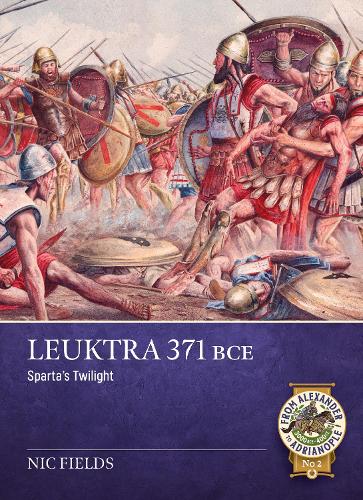
Lektra 371 BC: Spartas twilight
(Paperback)
Publishing Details
Lektra 371 BC: Spartas twilight
By (Author) Nic Fields
Helion & Company
Helion & Company
26th April 2025
15th April 2025
United Kingdom
Classifications
Physical Properties
Paperback
168
Width 180mm, Height 248mm
Description
The famous Spartan dbcle at Lektra was a gamechanger both politically and militarily. Having won the Peloponnesian War and inherited the Athenian hegemony of the Greek world, Sparta for the next three decades had proven unbeatable in hoplite battle. All that was to change during one afternoon in the high summer of 371 BC. Kleombrotos was killed with most of his royal guard when Epameinondas' Theban phalanx, which he had stacked 'fifty-shields deep' and fronted with the veteran Sacred Band, mowed down that of the Spartan king's. Moreover, the Theban general's use of what we know as the oblique order foreshadowed the combined arms tactics that was to be fully developed by Philip II of Macedon (onetime political hostage held in the house of Epameinondas), and subsequently employed to brilliant effect by his son Alexander the Great during his eye-opening success against the Persian Empire. The innovative generalship of Epameinondas had given the Thebans a critical victory over the best hoplite force in Greece. Crucially, the fall of their king virtually signalled the end of Sparta's hegemony over the Greek world, facilitating the, albeit brief, rise of Thebes. AUTHOR: Dr Nic Fields started his career as a biochemist before joining the Royal Marines. Having left the military, he went back to university and completed his doctorate in Ancient History at the University of Newcastle. He was Assistant Director of the British School at Athens, then a lecturer in Ancient History at the University of Edinburgh. He is now a freelance author and researcher based in southwest France, specializing in ancient military history. 23 b/w photos, 4 colour plates, 4 b/w maps
Author Bio
DR NIC FIELDS started his career as a biochemist before joining the Royal Marines. Having left the military, he went back to university and completed his doctorate in Ancient History at the University of Newcastle. He was Assistant Director of the British School at Athens, then a lecturer in Ancient History at the University of Edinburgh. He is now a freelance author and researcher based in southwest France, specializing in ancient military history.
